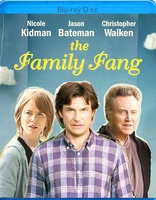The Family Fang Blu-ray Movie
HomeThe Family Fang Blu-ray Movie 
Starz / Anchor Bay | 2015 | 105 min | Rated R | Jul 05, 2016Movie rating
6.5 | / 10 |
Blu-ray rating
| Users | 0.0 | |
| Reviewer | 3.0 | |
| Overall | 3.0 |
Overview
The Family Fang (2015)
Caleb and Camille Fang (Christopher Walken and Maryann Plunkett) are a couple famous for their public, avant-garde comedy skits that featured their children, previously known as Child A and Child B. Now adults with successful showbiz careers of their own, Annie (Nicole Kidman) and Buster Fang (Jason Bateman) are estranged from their parents and lament their exploitation as children. However, when Caleb and Camille go missing at a bloody crime scene, Annie and Buster reunite at their childhood home to determine if their parents are truly in trouble or if their disappearance is their final career ruse.
Starring: Jason Bateman, Nicole Kidman, Christopher Walken, Marin Ireland, Josh PaisDirector: Jason Bateman
| Drama | 100% |
Specifications
Video
Video codec: MPEG-4 AVC
Video resolution: 1080p
Aspect ratio: 2.39:1
Original aspect ratio: 2.39:1
Audio
English: Dolby Digital 5.1 (448 kbps)
Subtitles
None
Discs
Blu-ray Disc
Single disc (1 BD)
Playback
Region A (B, C untested)
Review
Rating summary
| Movie | 3.5 | |
| Video | 4.0 | |
| Audio | 2.5 | |
| Extras | 0.0 | |
| Overall | 3.0 |
The Family Fang Blu-ray Movie Review
"Life is sweet so taste it while you still can."
Reviewed by Dr. Stephen Larson August 7, 2016Siblings Annie Fang (Nicole Kidman) and Baxter Fang (Jason Bateman) are attempting to forge their own occupational identities after years of being
reluctant participants in their parents' performance art pieces. Annie, a B-movie actor struggling to break into the mainstream, has made enough
money to lead a successful lifestyle. Baxter, a second-rate author beset by writer's block, is trying to pen an autobiographical novel that he hopes
will become his breakthrough. Brother and sister have tried to move on with their lives but are stuck with lingering memories and aphorisms that
their estranged parents gave them. Bateman, who also produced and directed The Family Fang, employs parallel editing in scenes of Annie
and Baxter working and playing to demonstrate that the two characters have not escaped their parents' wrath. For example, Annie is cajoled by her
director or producer to go topless in a scene. Initially, she asserts her individuality by rejecting his request. But then she gives in when recalling her
parents' credo that she can control a scene if she disregards the chaos around her and "owns the moment." This maxim also permeates Baxter's
mindscreen as he and his friends sidle around the countryside. Bateman reveals a paradox. Baxter seems free to do what he wants but he's
simultaneously bound by what his parents believe in when he agrees to be the punchline for a near deadly game.
The narrative arc and story progression may take the viewer some time to get used to. Bateman alternates between flashbacks in the seventies and other (performative) events in the Fang's family past with scenes in the present. The director achieves a nice "film-within-a-film" when the cinema camera goes inside home movies and then shows Annie watching them on the couch. The Family Fang is filled with binary oppositions (e.g., art vs. artifice, presentation vs. representation, et al.) so the bifurcated approach works quite well. After Bateman gives the Fang children a backstory, he introduces us to their idiosyncratic parents, Caleb (Christopher Walken) and Camille (Maryann Plunkett). Bateman trusts his audience enough not to have to give them a backstory too (we may infer that they were hippies and members of the counterculture). Bateman and screenwriter David Lindsay-Abaire intentionally obfuscate the precise roles that Caleb and Camille play in mass culture. While their intentions seem to be as quasi-documentary filmmakers and avant-garde comedic improvisors, the public spectacle that they subject their kids to also make them out to be provocateurs and con artists. Bateman inserts an amusing and informative interplay about the blurring of these lines when a writer for The Village Voice and a critic from Artforum argue about the Fangs' artistic virtues and their value to society.

No ordinary family gathering.
The movie's concentration on internal family dynamics and the cinematic style that Bateman uses to portray the Fangs' dysfunction reveal the influence of Ingmar Bergman and frequent cinematographer Sven Nykvist. Like Bergman and Nykvist, Bateman and his director of photography Ken Seng like to frame actors' faces in close-up and extreme close-up as a way to lay bare what their souls feel inside and out. (See the ECU of an anguished Caleb in the fore and the blurred focus on his wife in the Screenshots.) The interior scenes of The Family Fang are also shot in much the same way as Bergman/Nykvist: i.e., through doorways and arches that display a rather modern painterly style. Batman and Seng likewise fixate on the houses' architecture and how their decor reflects the personalities that inhabit them. I wish, however, that they would have held these shots of exteriors and outdoor locations longer to give the viewer more time to contemplate their meaning in relation to the characters.
Even at under two hours, the movie could have benefited from some trimming. For example, one scene at an amusement park goes on too long as
Caleb berates a cashier and manager at a concession stand. Bateman and Lindsay-Abaire also try to include some secondary characters who could
have been either excised or developed more. Nonetheless, the narrative delivers some appreciable ambiguities that keep the audience wondering if
Caleb and Camille are really Annie and Baxter's biological parents and whether or not they lived a secret life. At its core, The Family Fang is a
character mystery. It is also a study of family celebrity and a retrospective look at what are today's reality shows.
The Family Fang Blu-ray Movie, Video Quality 
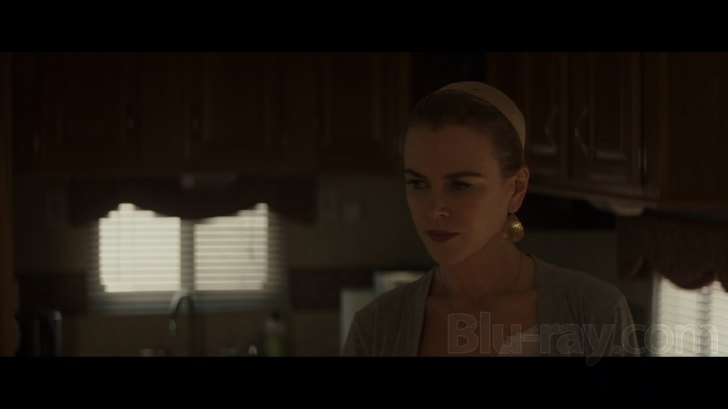
Anchor Bay/Starz present The Family Fang with an MPEG-4 transfer that approximates its 2.39:1 theatrical exhibition. The label has opted to give the film a Manufactured on Demand release on a BD-R 25 disc. The encode consistently demonstrates a healthy bitrate and the picture is strong and detailed throughout. Bateman seems to have used various film stocks and video for the flashbacks and home movies. The seventies footage exhibits a fairly thick layer of grain and some of the primary colors carry a nostalgic tinge. The older home movie footage looks more like videotape while more recent footage in the 2010s is definitely digital video. For the "regular" scenes in the present, definition is very good and detail on faces is mostly excellent. The transfer is by no means reference-quality but it gets the job done.
The Family Fang Blu-ray Movie, Audio Quality 
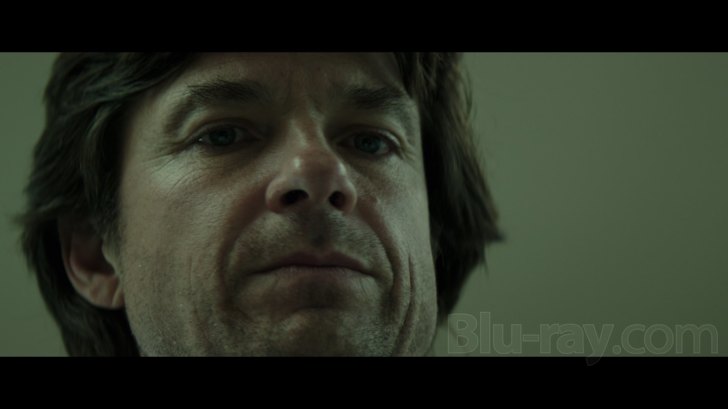
Unlike the transfer, the audio track on the disc is a disappointment. A lossy Dolby Digital 5.1 mix (encoded at a puny 448 kbps) is the only sound track available. The back cover mistakenly states Dolby TrueHD 5.1. Dialogue heard on the compressed track is serviceable but one feels that the various songs played and heard in the film could have been substantially amplified by a lossless codec. Carter Burwell's tenderhearted score comes across fairly well but the music is spread across primarily the front channels. Vocal cues are essentially given medium level treatment on the surrounds. It is also lamentable that no English subtitles or captions are provided (again, the cover erroneously labels English SDH).
The Family Fang Blu-ray Movie, Special Features and Extras 
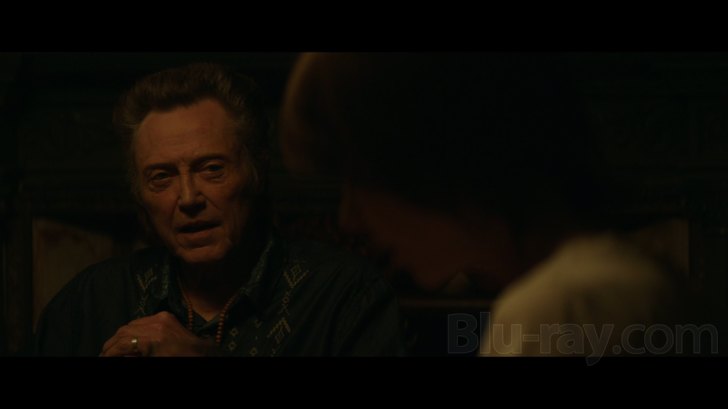
There are absolutely zero extras on the disc. After insertion of the disc, the FBI Warning appears and then the movie starts. There is no pop-up menu, main menu, or sub-menus to choose from.
The Family Fang Blu-ray Movie, Overall Score and Recommendation 
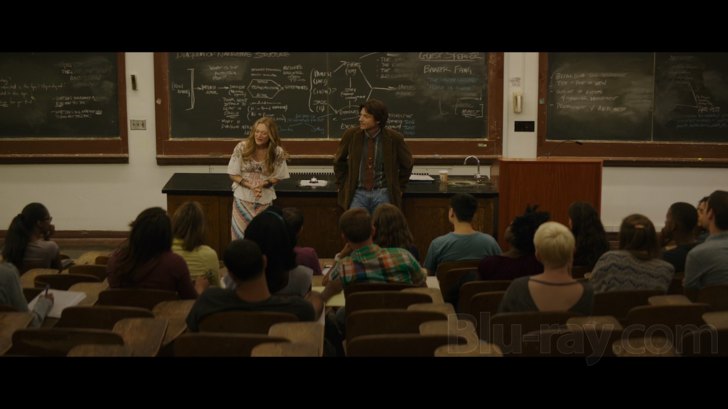
Jason Bateman's The Family Fang certainly deserves a much wider audience than the lucky ones who paid to see it in the theater. According to Box Office Mojo, the film was only shown on fifty-two screens and grossed a paltry $262,921. The narrative structure can take time to get used to but spectators should be rewarded with multiple viewings. Anchor Bay/Starz's bare-bones disc contains a very solid video presentation and a lackluster audio track. Currently, this appears to be the only version available worldwide. Recommended for the merits of the film and the above-average transfer.
Similar titles
Similar titles you might also like
(Still not reliable for this title)

I, Tonya
2017

Strangerland
2015

True Story
2015

Dark River
2017

The Judge
2014

My Old Lady
2014

On the Basis of Sex
2018

Christine
2016

Molly's Game
2017

The Company You Keep
2012

Felony
2013

Ben Is Back
2018

The Wizard of Lies
2017

Wonderstruck
2017

Truth
2015

Lion
2016

The 9th Life of Louis Drax
2016

Vice
2018

Infinitely Polar Bear
2014

Pawn Sacrifice
2014
